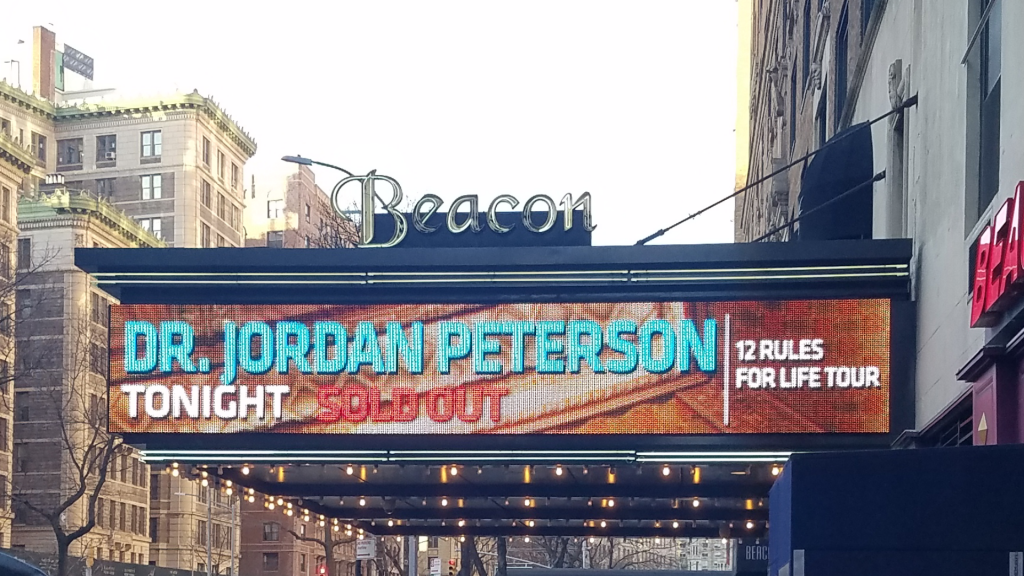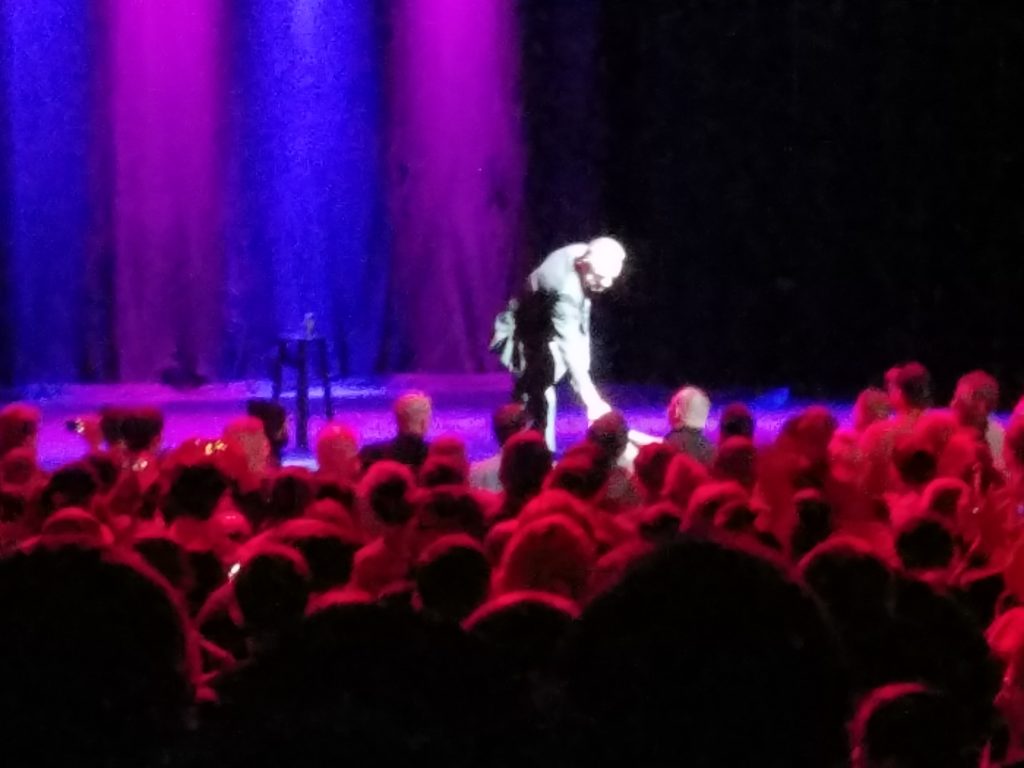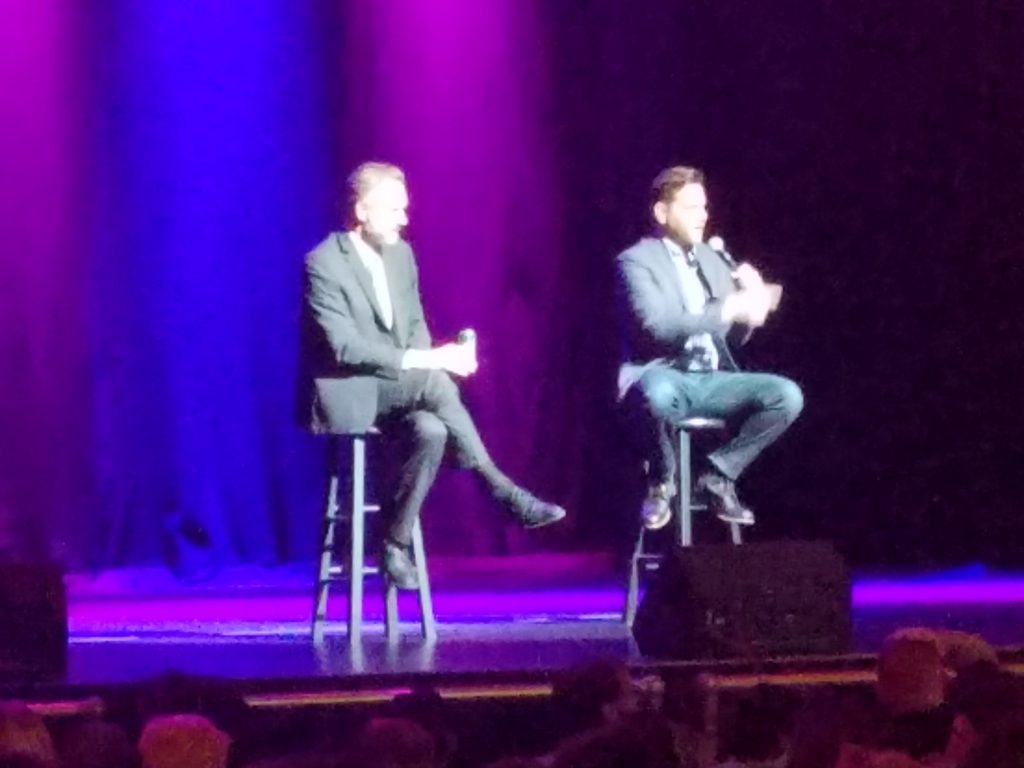Jordan Peterson begins ’12 Rules for Life’ Tour at the Beacon Theatre in New York

Dr. Jordan Peterson began his “12 Rules for Life” tour this past Sunday at the Beacon Theatre in New York. The impassioned intellectual from northern Alberta, Canada spoke about how to make life meaningful despite the suffering and malevolence we will all inevitably experience.
The first time I heard Peterson speak I woke up hungover on a friends couch to a discussion between Joe Rogan and Peterson about how anyone could become a guard at a concentration camp. Peterson, a professor and clinical psychologist in Toronto, rose to prominence after he criticized legislation in Canada that he believed implemented compelled speech.
After that I noticed his name on a few YouTube video thumbnails and the same friend, Dylan, whose couch I had crashed on, sent me a video where people were accosting Peterson at a talk he gave.
Eventually, clips of his lectures ended up in my recommended section. I steered away from the viral controversies and gravitated towards some of his assessments of personal responsibility and the symbolic significance of mythological stories.
I am a 22-year-old straight white male that lost his father in high school and is interested in psychology, so I fit directly at the epicenter of Peterson’s demographic.
At some point, I found myself agreeing with him too much and that felt like a problem. I know that there are flaws in everyone’s logic and we are all subject to bias, so I made it a point to remain skeptical about everything I heard.
Despite that, I still consider myself a fan. There are a lot of reasons why people have a problem with what he says in regards to gender and biology, but he speaks to my demographic and me personally. I’m not so naive that I take everything that he says as gospel. I use what I think works and remain skeptical about the rest.
Naturally, I was excited when I saw that Peterson was getting ready to tour for his new book “12 Rules for Life: An Antidote to Chaos.” I managed to grab tickets with a promo code Dylan had. Doors opened at 6:30 p.m. and it was supposed to start at 7:30 p.m. They said to get there a half-hour in advance to make sure there was enough time to get through security. I figured they would have increased the security given the recent protest that disrupted a talk at Queens College. Several guards in large coats corralled people through the metal detectors and shouted for us to take all of the metal objects out of our pockets.
While we waited in line, a K-9 unit and venue administrator walked along the crowd. Some unmarked journalists stood outside filming the entrance and asked people if they would like to be interviewed. I only saw them talk to one woman and they asked why she was there. She was very articulate and knew what she wanted to say. But, she jumped on the question and anticipated that they might be critical of the fact that she and her friend were there. She started defending Peterson almost immediately even though no one explicitly went after him. It spoke to the climate surrounding him as a public figure. I can’t tell if that is a symptom of some of his more inflammatory opinions or that people like to latch onto the controversy because it’s exciting.
A little after 7:30 p.m an announcer brought out Dave Rubin of the Rubin Report, which was a fun surprise. I like Dave and his show but have only seen the handful of episodes with Peterson in them. Rubin appeals to a similar crowd of people who might listen to the Joe Rogan Podcast and he shares many of the same guests.
He made some opening remarks about how great it was that everyone had made it out in support of the free exchange of ideas. He talked about the events surrounding some of Peterson’s controversy and pandered to the crowd a little with some easy jokes. I suppose if I were trying to introduce Peterson I would do the same, but something about it hit my ear wrong. Especially with the guy behind me hollering at the easy-to-catch references and yelling to make sure everyone knew he knew what was happening.
The lighting in the theater shifted as Rubin brought out Peterson and a purple glow enveloped the stage while the crowd applauded wildly. Once the applause had died down, Peterson launched directly into laying out the 12 rules he describes in his book.
He joked about probably not getting through them all. I expected just as much. From watching him in the past I knew there would have to be a limit to his time, just because it wouldn’t make sense for people to sit in a theater for five uninterrupted hours. No matter how willing they were to listen people need bathroom breaks and refreshments.
He managed to cover the first six rules before the Q&A:
- Stand up straight with your shoulders back.
- Treat yourself like someone you are responsible for helping.
- Make friends with people who want the best for you.
- Compare yourself to who you were yesterday, not to who someone else is today.
- Do not let your children do anything that makes you dislike them.
- Set your house in perfect order before you criticize the world.
At the heart of each rule was an encouragement to live life in a way that justifies the inherent suffering and malevolence that comes with being alive. He established early on that everyone’s life is an utter catastrophe. Suffering, death and malevolence are a prerequisite of existence. But, if you try to live as forthrightly as possible, it is possible to justify your suffering.
He also explored how our fragility in this way is what makes our lives meaningful in the first place. To illustrate this point he shared an anecdote about his son and shared the fear that comes with being a parent—allowing your child to venture out into the world where they can be hurt. Then, he imagined the alternative, and imagined what his son would be like if he were invulnerable, 20 feet tall and made of titanium. The trade off would be that he would lose his humanity in the process. You don’t want your children to be hurt, but their fragility is inextricable from what makes them lovable and human.
So, if we are destined to suffer and die, then what is the alternative? You could take revenge on the nature of being itself. Or, you could work to make your life justifiable, despite its inherent suffering.
Rubin came out at the end of Peterson’s standing ovation and started to set up the question-and-answer portion of the show. Lines formed behind microphones brought in to the aisles and everyone waited patiently for their turn to ask the doctor a question.
The most critical and challenging question came from a woman who had asked about the Queens College incident and what Peterson would feel is an appropriate way to protest? She cited how Peterson referred to the protestors at his talk as “Narcissistic” for selfishly depriving the students who came to the talk of their right to hear it. But, then she compared that to a situation where people protesting the shooting of an unarmed man shut down a highway and deprived commuters of the right to use the road.
It didn’t seem as though Peterson managed to fully address the question in that small of a time frame, but he talked about how certain situations call for protests, and also acknowledged that he felt like protests are a hangover and a cheap artifact of 1960s activism.
The final question of the night was related to the recent gun-control controversies in America. The last man at the microphone asked what could be a potential solution to these issues. Peterson responded by saying that events like this one, which foster serious conversations about the necessity of personal responsibility and the importance of finding meaning in a way that allows life to be justifiable despite its inherent suffering, are a good place to start.
I left the event more satisfied than annoyed and enjoyed getting to hear Peterson speak live for once instead of sitting behind a screen. The only downside here was that I couldn’t pause the lecture to go look up a word or take a bathroom break. In any case, it was a strong way to start off the tour and I felt privileged to be able to witness it myself.
For more information on Peterson check out his lectures on YouTube, get a copy of “12 Rules for Life: An Antidote to Chaos,” out now on all major platforms, or try and grab a ticket to see him in Atlanta at the Tabernacle on Tuesday, June 12.

























